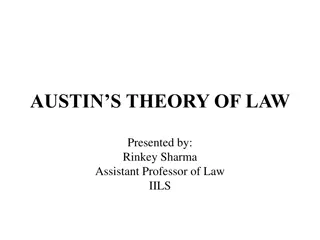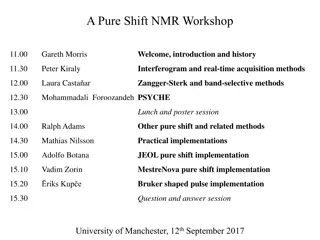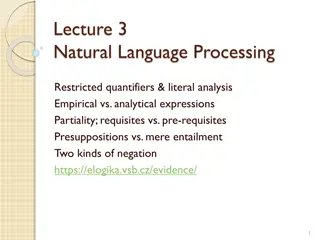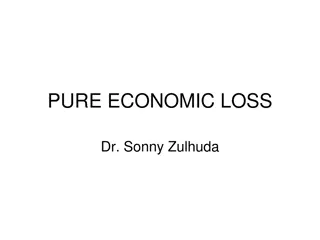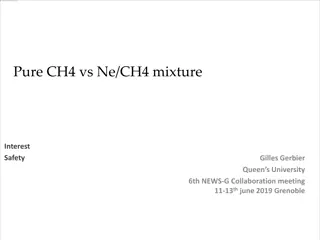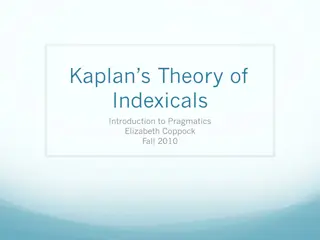Analytical School and Kelson's Pure Theory of Law: A Critical Analysis
Kelsen's Pure Theory of Law emphasizes the hierarchy of norms and the normative character of law, free from extra-legal elements. This theory, in contrast to other perspectives like Hart's, aims to maintain the purity of law by isolating strictly legal components. Kelsen's focus on normative behavior and the cleansing of changeable elements makes his theory significant in legal philosophy.
Download Presentation

Please find below an Image/Link to download the presentation.
The content on the website is provided AS IS for your information and personal use only. It may not be sold, licensed, or shared on other websites without obtaining consent from the author. Download presentation by click this link. If you encounter any issues during the download, it is possible that the publisher has removed the file from their server.
E N D
Presentation Transcript
ANALYTICAL SCHOOL AND KELSON Introduction Pure Theory of Law Hierarchy of normative relation Effectiveness and Validity International law and Kelson s theory Application Of Kelson sTheory In The Indian Scenario Indian Case Analysis On Kelsonian Concept Of Law Critical Evaluation
Introduction Kelsen, an analytical jurist, in his Pure Theory of Law says, Law is the norm which stipulates sanction. Kelsen s Pure Theory is about the hierarchy of norms. He also says about the normative behaviour which takes validity from the Ground norm . In his Pure Theory of Law says Kelsen, that law should be kept pure from extra legal affairs. But Prof. H.L.A. Hart propounded that law is Union of Primary and Secondary Rules . He also said about the minimum content of morality within the framework of Analytical School. Here Kelsen established the normative character of law. On the other hand Hart gave emphasis on rule. It is core reality that Austin, Kelsen and Hart established the coercive character of law in different ways. The objective and scope of the topic is very wide. A set of behavioural norm is in every society. The normative behaviour control and regulate the human being. The pure theory is free from any extra-legal element and the sanction is also under the scope of the norms.
Pure Theory of Law Hans Kelsen, the jurist who belonged to the Vienna School, propounded the Pure Theory. He claimed that his theory is applicable to all places and all the times. If it is observed minutely really Kelsen theory must get the universal acceptance. A theory of law must be free from ethics, politics, sociology, history etc; it must in other words be Pure (rein). Uncritically he said, the science of law has been mixed with the elements of psychological, sociology, ethics and political theory. He sought to restore the purity of the law by isolating those components of the work of a lawyer or judge which may be identified as strictly legal. Kelsen actually wants to make the law pure and that is why he tried to cleanse of all that is changeable and he is quite able to give this idea to search the justice.Kelsen does not bother about the morality,political and ideological value judgement. According to Kelsen s Pure theory of law, the objects of the science of law are those norms which have the character of legal norm, which makes certain acts legal or illegal. By the term norm, Kelsen means that something ought to be or ought to happen, especially that a human being ought to behave in a certain way. Finally laws being ought proposition, knowledge of law means a knowledge of ought i.e. norms and a norm is a proposition in hypothetical form: if X happen, thenY ought to be happen. It is very much clear that Kelsen wants to say that law is depend on condition and consequence in a process of normative way.According to the above discussion it is found that the element of sanction lies on the norms but not the psychological element. The legal norms are the valid norm and it is quite pure from extra-legal elements.
Hierarchy of Normative Relation The science of law to Kelsen is the knowledge of hierarchy of normative relation. He builds on Kant s theory of knowledge and extends the theoretical knowledge to law also.6 For Kelsen the law consists of norms: norms can not be derived from facts, but only from other norms. The relationship between norm is one of imputation not causality. According to Kelsen, a dynamic system is one in which fresh norm are constantly being created on the authority of original, or basic, norm, a Ground norm; a static system is one which is at rest in that the basic norm determines the content of those drives from it in additional to imparting validity to them. The Grund norm is the presupposition and the other norms get validity from the Grund norm. Every country has its own Grund norm from which the other norm is being originated. The Grund norm is the basic norm
Kelsen recognized that the Ground norm need not be the same in every legal order, but a Ground norm of some kind there will always be, whether, eg a written constitution or the will of a dictator. The Ground norm is not the constitution, it is simply the presupposition, demanded by theory, that this constitution ought to be obeyed. Therefore, the Ground norm is always adopted to the prevailing state of affair. The Ground norm only imparts validity to the constitution and all other norm derived from it. The fact that in great Britain the fountain of validity rests with statute, precedent and immemorial customs does not contradict Kelsen s thesis, for what he contended was that a system cannot be found on conflicting Ground norms. In Britain there is no conflict between the authority of the crown of the Parliament, judicial precedent and customs, they takes precedence in that order. Kelsen distinguishes the legal norm and normal norm. Legal norm derives it validity from the external sources and the particular ought of the legal,as distinguish from the moral norm, is the sanction.
Kelsen found the distinction between legal and other oughts in that the former backed by the force of the state, the preoccupation of law being with the prospect of disobedience rather than obedience. Thus, it is prescription of sanction that imparts significance to a norm, or putting it in another way, Law is the primary norm, which stipulates the sanction. Only in this way does, law arrive at its essential function. It is true that in the statement, if a person does X, then Y ought to happen, there is implicit the idea that a person ought not to do X if he wants to do avoid Y, i.e. not doing X is the effective means of avoiding Y. Yet the law is only invoked when X has been done. In this way a legal norm prescribes conduct by attaching sanction to contrary behaviour. Kelsen although does not define law as a command. Kelsen is of the view that it introduce a psychological element into the theory of law should be Pure . Yet law is a rule of conduct is like Austin s command whose validity is to be judge with reference to Ground norm. In this sense Kelsen is a positivist or empiricist for as Austin law of command. Kelsen also asserts the identity of state and law. As a political organization state is a legal order and every state is governed by law. The expression government of laws is therefore pleonasm to Kelsen.
Effectiveness and Validity Kelsen s effectiveness is Austin s habitual obedience and something more than norm application by legal organs. Minimum of effectiveness is condition of validity for any norm to exist. Effectiveness means a norm is applied by legal organ and obeyed by subjects. Validity means in addition to application and obedience,the norm ought to be obeyed and applied. A single norm and a legal order as a whole cannot be regarded as valid,when they cease to be effective.Effectiveness is added to the fact of norm creation. A legal order does not lose validity because a single norm losses effectiveness. Accordingly a norm, which is never applied and obeyed,losses its validity.
International law and Kelsen theory Kelsen tried to establish the supremacy of international law.On no point the weakness and limitations of his theory are more exposed than on this.It made him to run a number of inconsistencies.Kelsen is out to say that the International law should also be considered a juridical order. To remove the difficulty which arises by the fact that international law does not possess all characteristics of law, specially the apparatus of compulsion, he says that it is comparable to primitive law. As law in the beginning was in customary from without an adequate sanction and assumed the present from after a course of evolution, so the present international law is (like primitive law) in its early stage, and in future it will have all the characteristics which the modern law has so far as the Ground norm of International law is concerned, Kelsen points out that it is in Pacta Sunta Servanda . He says that the sanctions of International Law are war and reprisals.
APPLICATION OF KELSEN THEORY IN THE INDIAN SCENARIO The Indian people has their own philosophy. But if we look minutely, we can found that the Kelsen theory is in the Indian society as for example Dharma. Dharma consist of rule of daily routine. It gives a set of behavior to control the human society. We can say that Dharma is the Grund norm and other norm generates from the Dharma. Application of Kelsen s Pure Theory to the ancient Indian legal system and to British Indian legal system gives an insights into the fundamental difference between the two legal systems. The norm posited in the latter case is that we ought to obey the viceroy or governor-general, who was not responsive to Indian moral or cultural norm and ethos or to the public opinion. The position of such a norm make the entire system Austinian where under even the sovereign s caprice can become the law.
INDIAN CASE ANALYSIS ON KELSONIAN CONCEPT OF LAW In the case of A.K. Gopalan v/s State of Madras, interpreted the expression, the procedure established by law in Article 21of the Constitution of India as any substantive or procedural provision of enacted law. However,in Maneka Gandhi v/s Union of India, the Supreme Court of India adopted an interpretation which brought Article 21 of the Constitution of India 25 into a concept of fairness, justness and reasonableness which is not there in the word of that article. The meaning of the definition of fair, just and reasonable could vary from person to person and is a reflection of ideology of an individual which consideration if brought to bear upon the test of constitutional validity of particular statute liable to be struck down if it is not in conformity with the mental conception of an individual who is the judge. where it
While A.K. Gopalan s case gave limitless power to the law maker, Kesavanda Bharati s case introduced the doctrine of basic structure according to which the term amendment in Article 368 of the Indian Constitution means addition or change within the contour of the preamble or the constitution but not replacement of the constitution or its basic foundation and structure. Kelsen s Pure Theory provides the principle of judgement in Kesavananda Bharati, the Grund Norm cannot be replaced except by revolutionary methods. Basic structure is unamenable, limitless and indivisible like Austin s Sovereign. Kelsen s Grund Norm is alterable by changing the presupposition.
CRITICAL EVALUATION Some writer criticized Kelsen s theory is not pure because the effectiveness of the Grund norms depends on sociological, political factors also. Kelsen pointed out that the Grund norm is presupposition that the constitution ought to be obeyed. Here I constitution of a country is a political document and so the Grund norm is not pure. Kelsen also pointed out that law should be kept-free from morality. A general question should be raised here,whether is it possible to keep law free from morality? Kelsen made emphasis in the effective of law and by this way he indirectly accepted the morality as a part of effectiveness.He also propounded that if X happens then Y ought to be happen by this proposition he also indirectly supported the value. Prof. Stone observes: The social effects and question of justice excluded, though from all the side-doors and backdoors of his pyramid of norms, the front-door is wider open to both. Prof. Laski says, Granted its postulates, I believe the pure theory to be unanswerable but I believe also that its substance is an exercise in logic and not in life. think that a
One of the great drawback of Kelsen s theory that he did not make any kind of the measure regarding the effectiveness. There is no demarcating line under the idea of effectiveness. Kelsen drew no distinction between effectiveness which makes people obliged to obey and effectiveness which makes people under an obligation to do so. In Kelsen theory it is significant that the state is just like a set of human behaviour and set of social compulsion. But in reality a state is constituted by territory, independent government, population and ability to enter into relation to any other state but he over looked this points. He tried to put the idea that the state and legal orders are identical but all legal ordered is not state like highly decentralized ordered such as in primitive communities.
The pure theory is demanded that a Grund norm be discovered, if there are conflicting possibilities then there are no guidance in choosing between them. But in the aspect of international laws there are two Grund norm one is supreme municipal system and another is supreme international system. So here are two conflicting supremacy and then the Kelsen s theory is failure to give the guidance regarding the conflicting Grund norm. Kelsen s theory over the international law can be criticized by this manner that international law is based on, pacta suntan servanda . It is the matter of custom, good faith, ethics etc. but Kelsen tried to keep law separate from ethics and custom and so his theory is not a pure theory. Regarding the sanction under international law that is the war and reprisal is also under the custom.
According to the sociological jurist law is not a norm but social facts. On the other hand the historical school thinks that law is custom but not the norms. Friedmann states The merciless way in which Kelsen has uncovered the political ideology hidden in the theories which profess to state objective truth has had a very wholesome effect on the whole field of legal theory. Hardly a branch of it, whether natural law theories, theories of international laws, or corporate personality of public and private law has remained untouched. Even the bitterest of the Vienna School have concluded that it has forced legal theory to reconsider its position.
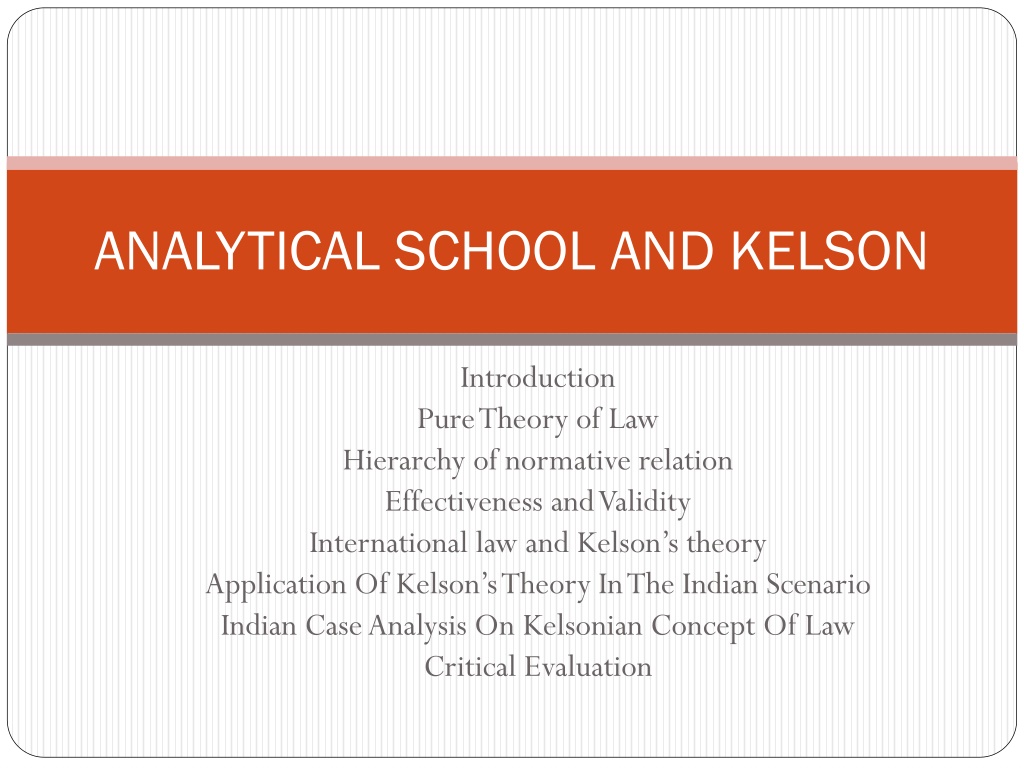
 undefined
undefined













